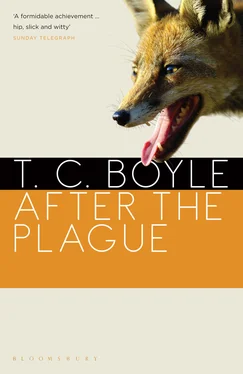The man beside her — her neighbor — was eating now. He was hungry, and that was good. She felt saintly, watching him eat and listening to him chatter on about his work — he was some sort of writer or journalist, on his way to Philadelphia for the holidays. She’d renounced the pasta and given it to him, and he was grateful — he hadn’t eaten all day, and he was a growing boy, he said, with a smile, though he must have been in his early thirties. And unmarried, judging from his naked fingers. When the drinks cart came by, Ellen ordered another Scotch.
They were talking about movies, maybe the only subject people had in common these days, when Ellen glanced up to see Lercher, his face twisted in a drunken scowl, looming over them as he made his unsteady way to the forward lavatories. She and her companion — his name was Michael, just Michael, that was all he offered — had struck a real chord when it came to the current cinema (no movies with explosions, no alien life-forms, no geriatric lovers, no sappy kids), and she’d begun to feel something working inside her. She was interested, genuinely interested in something, for maybe the first time in months. Michael. She held the name on her tongue like the thinnest wafer, repeating it silently, over and over. And then it came to her: he was the anti-Roy, that’s who he was, so polite and unassuming, a soul mate, somebody who could care, really care — she was sure of it.
“You see that man?” she asked, lowering her voice. “The one with the hair? He was sitting right next to me on the last flight, the one where, well, I was telling you, I was looking out the window and the engine caught fire? And I’ve never been so scared in my life.”
The wind shrieked along the length of the fuselage, the lights dimmed and went up again, Michael poured himself a second glass of wine and made sympathetic noises. “You actually saw this? Flames? Or was it like sparks or something?”
She went cold with the memory of it. “Flames,” she said, pursing her lips and nodding her head. “I was so scared I started praying.” She glanced out the window, as if to reassure herself. “You’re not religious, are you?” she said, turning back to him.
“No,” he said, and he raised his hand to cut the throat of the subject before it could take hold of him. “I’m an atheist. I mean, we had no set religion in our house, that’s just the way my parents were.”
“Me too,” she said, remembering religious instruction, the icy dip of the holy water, her mother in a black veil, and the priest intoning the sleepy immemorial phrases of her girlhood, “but we went to church when I was little.”
He didn’t ask what church, and a silence fell between them as the plane rocked gently and the big man oscillated back from the lavatory. Ellen closed her eyes again, for just a moment, the swaying of the cabin and the pills and the Scotch pulling her down toward some inky dark place that was like the mouth of an abandoned well, like a cave deep in the earth….
She was startled awake by a sudden explosion of voices behind her. “The fuck I will!” snarled a man’s voice, and even through the fog of her waking she recognized it.
“But, sir, I’ve already told you, the plane is full. You can see for yourself.”
“Then put me up front — and don’t try to tell me that’s full, because I was up there to use the rest room, and there’s all sorts of space up there. This is bullshit. I’m not going to sit here squeezed in like a rat. I paid full fare, and I’m not going to take this shit anymore, you hear me?”
Heads had begun to turn. Ellen glanced at Michael, but he was absorbed with his computer, some message she couldn’t read, some language she didn’t know; for a moment she stared at the ranks of dark symbols floating across the dull firmament of the screen, then she craned her neck to see over the seat back. Lercher was standing in the aisle, his shoulders hunched, his head cocked forward against the low ceiling. Two flight attendants, the broad-faced woman and another, slighter woman with her hair in a neat French braid, stood facing him.
“There’s nothing we can do, sir,” the slight woman said, an edge of hostility in her voice. “I’ve already told you, you don’t qualify for an upgrade. Now, I’m going to have to ask you to take your seat.”
“This is bullshit,” he reiterated. “Two and a half fucking hours on the ground, and then we get sent back to LAX, and now I’m stuck in this cattle car, and you won’t even serve me a fucking drink? Huh? What do you call this?” He flailed his arms, appealing to the people seated around him; to a one, they looked away. “Well, I call it bullshit!” he roared.
The women held their ground. “Sit down, sir. Now. Or we’ll have to call the captain.”
The big man’s face changed. The crease between his eyes deepened; his lips drew back as if he were about to spit down the front of the first woman’s crisp blue jacket. “All right,” he said ominously, “if that’s how you want to play it,” and he was already swinging around and staggering toward the rear of the plane, the flight attendants trailing along helplessly in his wake. Ellen shifted in her seat so she could follow their progress, her hips straining against the seat belt, her right hand inadvertently braced against Michael’s forearm. “Oh, I’m sorry,” she murmured, even as Lercher disappeared into the galley at the rear and she turned her face to Michael’s. He looked startled, his eyes so blue and electric they reminded her of the fish in the classroom aquarium — the neon tetras, with their bright lateral stripes. “Did you see that? I mean, did you hear him — the man, the one I was telling you about?”
He hesitated a moment, just staring into her eyes. “No,” he said finally, “I didn’t notice. I was — I guess I was so absorbed in my work I didn’t know where I was.”
Ellen’s face darkened. “He’s the worst kind of trash,” she said. “Just mean, that’s all, like the bullies on the playground.”
And now there was the sound of a commotion from the rear of the plane, and Ellen turned to see Lercher emerge from the galley on the far side of the plane, the flight attendants cowering behind him. In each hand he wielded a gleaming stainless-steel coffeepot, and he was moving rapidly up the aisle, his eyes gone hard with hate. “Out of my way!” he screamed, elbowing a tottering old lady aside. “Anybody fucks with me gets scalded, you hear me?”
People awoke with a snort. A hundred heads ducked down protectively, and on every face was an expression that said not now, not here, not me. No one said a word. And then, suddenly, a male flight attendant came hurtling down the aisle from the first-class section and attempted to tackle the big man, gripping him around the waist, and Ellen heard a woman cry out as hot coffee streamed down the front of her blouse. Lercher held his ground, bludgeoning the flight attendant to the floor with the butt of the wildly splashing pot he clutched in his right fist, and then the two female attendants were on him, tearing at his arms, and a male passenger, heavyset and balding, sprang savagely up out of his seat to enter the fray.
For a moment, they achieved a sort of equilibrium, surging forward and falling back again, but Lercher was too much for them. He stunned the heavyset man with a furious, slashing blow, then flung off the flight attendants as if they were nothing. The scalded woman screamed again, and Ellen felt as if a knife were twisting inside her. She couldn’t breathe. Her arms went limp. Lercher was dancing in the aisle, shouting obscenities, moving backward now, toward the galley, and God only knew what other weapons he might find back there.
Where was the captain? Where were the people in charge? The cabin was in an uproar, babies screaming, voices crying out, movement everywhere — and Lercher was in the galley, dismantling the plane, and no one could do anything about it. There was the crash of a cart being overturned, a volley of shouts, and suddenly he appeared at the far end of Ellen’s aisle, his face contorted until it was no human face at all. “Die!” he screamed. “Die, you motherfuckers!” The rear exit door was just opposite him, and he paused in his fury to kick at it with a big booted foot, and then he was hammering at the Plexiglas window with one of the coffeepots as if he could burst through it and sail on out into the troposphere like some sort of human missile.
Читать дальше












